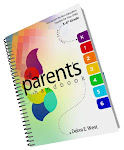How Can My Child Become More "Nature Smart"?
 According to You're Smarter Than You Think, by Thomas Armstrong, PhD., here are some ways that you can help your child enjoy and expand their Nature Smart skills. Try any activity that appeals to your child no matter how Nature Smart you think he/she is:
According to You're Smarter Than You Think, by Thomas Armstrong, PhD., here are some ways that you can help your child enjoy and expand their Nature Smart skills. Try any activity that appeals to your child no matter how Nature Smart you think he/she is:1. Notice nature wherever you are. Maybe watching ants being industrious on the playground blacktop, noting the different flowers and vegetables growing in the community garden, enjoying the changing of the leaves.
2. Plant something and watch it grow. Your child can plant flowers, a pepper plant, or any plant that interest him/her.
3. Lie down in the yard and look at the sky. On a sunny afternoon, notice the different kinds of clouds in the sky.
4. Look at the sky on a clear night. What color is the sky? Look at the moon and see if your child can tell what stage it's at.
5. If your child looks at the stars, have him/her learn the constellations.
6. Start a garden. If you don't have a yard, try growing a window-box garden of flowers or herbs. Start a community garden with other kids or grown-ups.
7. Go bird watching. Get some binoculars and go out to the wooded area near home or school and observe the different types of birds.
8. Watch nature shows on television. Nature, Nova, and National Geographic on PBS are good places to start.
9. Read books and magazines about nature. Look for books about animals, dinosaurs, or rain forest (or any part of nature your child is interest in).
10. Get involved with an environmental organization. You can work with local groups.
11. Volunteer for a "green" school or community project. Work with a recycling program or raise awareness about saving the rain forest.
12. Take care of a pet. Suggest your child is in charge of raising and taking care of a family pet or classroom pet.
13. Build your own ecosystem. Put together an aquarium, terrarium, ant farm or some to her portable ecosystem with your child.
14. Look at the ground beneath your feet. Your child can learn a lot about where you live from the dirt and rocks.
15. Start a collection. Bugs of all kinds, leaves, flowers, and rocks can be good things to collect.
16. Learn how to cook. There are lots of fun things your child can learn to make and cook.









0 comments:
Post a Comment